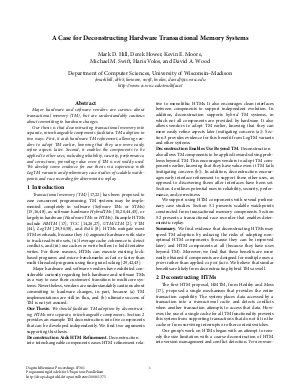A Case for Deconstructing Hardware Transactional Memory Systems
Authors Mark D. Hill, Derek Hower, Kevin E. Moore, Michael M. Swift, Haris Volos, David A. Wood
-
Part of:
Volume:
Dagstuhl Seminar Proceedings, Volume 7361
Part of: Series: Dagstuhl Seminar Proceedings (DagSemProc) - License:
 Creative Commons Attribution 4.0 International license
Creative Commons Attribution 4.0 International license
- Publication Date: 2008-02-06
File

PDF
DagSemProc.07361.3.pdf
- Filesize: 0.84 MB
- 8 pages
Document Identifiers
Subject Classification
Keywords
- Hardware transactional memory
Metrics
- Access Statistics
-
Total Accesses (updated on a weekly basis)
0Document
0Metadata
Abstract
Major hardware and software vendors are curious about transactional memory (TM), but are understandably cautious about committing to hardware changes. Our thesis is that deconstructing transactional memory into separate, interchangeable components facilitates TM adoption in two ways. First, it aids hardware TM refinement, allowing vendors to adopt TM earlier, knowing that they can more easily refine aspects later. Second, it enables the components to be applied to other uses, including reliability, security, performance, and correctness, providing value even if TM is not widely used. We develop some evidence for our thesis via experience with LogTM variants and preliminary case studies of scalable watchpoints and race recording for deterministic replay.
Cite As Get BibTex
Mark D. Hill, Derek Hower, Kevin E. Moore, Michael M. Swift, Haris Volos, and David A. Wood. A Case for Deconstructing Hardware Transactional Memory Systems. In Programming Models for Ubiquitous Parallelism. Dagstuhl Seminar Proceedings, Volume 7361, pp. 1-8, Schloss Dagstuhl – Leibniz-Zentrum für Informatik (2008)
https://doi.org/10.4230/DagSemProc.07361.3
BibTex
@InProceedings{hill_et_al:DagSemProc.07361.3,
author = {Hill, Mark D. and Hower, Derek and Moore, Kevin E. and Swift, Michael M. and Volos, Haris and Wood, David A.},
title = {{A Case for Deconstructing Hardware Transactional Memory Systems}},
booktitle = {Programming Models for Ubiquitous Parallelism},
pages = {1--8},
series = {Dagstuhl Seminar Proceedings (DagSemProc)},
ISSN = {1862-4405},
year = {2008},
volume = {7361},
editor = {Albert Cohen and Mar{\'\i}a J. Garzar\'{a}n and Christian Lengauer and Samuel P. Midkiff},
publisher = {Schloss Dagstuhl -- Leibniz-Zentrum f{\"u}r Informatik},
address = {Dagstuhl, Germany},
URL = {https://drops.dagstuhl.de/entities/document/10.4230/DagSemProc.07361.3},
URN = {urn:nbn:de:0030-drops-13759},
doi = {10.4230/DagSemProc.07361.3},
annote = {Keywords: Hardware transactional memory}
}
